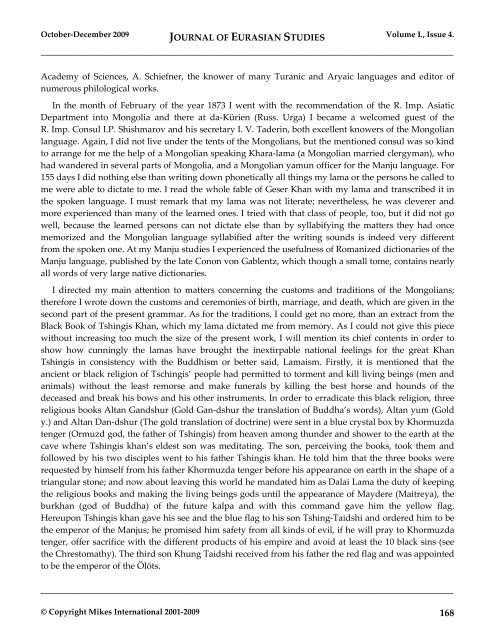JOURNAL OF EURASIAN STUDIES
JOURNAL OF EURASIAN STUDIES
JOURNAL OF EURASIAN STUDIES
Create successful ePaper yourself
Turn your PDF publications into a flip-book with our unique Google optimized e-Paper software.
October-December 2009 <strong>JOURNAL</strong> <strong>OF</strong> <strong>EURASIAN</strong> <strong>STUDIES</strong> Volume I., Issue 4.<br />
_____________________________________________________________________________________<br />
Academy of Sciences, A. Schiefner, the knower of many Turanic and Aryaic languages and editor of<br />
numerous philological works.<br />
In the month of February of the year 1873 I went with the recommendation of the R. Imp. Asiatic<br />
Department into Mongolia and there at da-Kürien (Russ. Urga) I became a welcomed guest of the<br />
R. Imp. Consul I.P. Shishmarov and his secretary I. V. Taderin, both excellent knowers of the Mongolian<br />
language. Again, I did not live under the tents of the Mongolians, but the mentioned consul was so kind<br />
to arrange for me the help of a Mongolian speaking Khara-lama (a Mongolian married clergyman), who<br />
had wandered in several parts of Mongolia, and a Mongolian yamun officer for the Manju language. For<br />
155 days I did nothing else than writing down phonetically all things my lama or the persons he called to<br />
me were able to dictate to me. I read the whole fable of Geser Khan with my lama and transcribed it in<br />
the spoken language. I must remark that my lama was not literate; nevertheless, he was cleverer and<br />
more experienced than many of the learned ones. I tried with that class of people, too, but it did not go<br />
well, because the learned persons can not dictate else than by syllabifying the matters they had once<br />
memorized and the Mongolian language syllabified after the writing sounds is indeed very different<br />
from the spoken one. At my Manju studies I experienced the usefulness of Romanized dictionaries of the<br />
Manju language, published by the late Conon von Gablentz, which though a small tome, contains nearly<br />
all words of very large native dictionaries.<br />
I directed my main attention to matters concerning the customs and traditions of the Mongolians;<br />
therefore I wrote down the customs and ceremonies of birth, marriage, and death, which are given in the<br />
second part of the present grammar. As for the traditions, I could get no more, than an extract from the<br />
Black Book of Tshingis Khan, which my lama dictated me from memory. As I could not give this piece<br />
without increasing too much the size of the present work, I will mention its chief contents in order to<br />
show how cunningly the lamas have brought the inextirpable national feelings for the great Khan<br />
Tshingis in consistency with the Buddhism or better said, Lamaism. Firstly, it is mentioned that the<br />
ancient or black religion of Tschingis’ people had permitted to torment and kill living beings (men and<br />
animals) without the least remorse and make funerals by killing the best horse and hounds of the<br />
deceased and break his bows and his other instruments. In order to erradicate this black religion, three<br />
religious books Altan Gandshur (Gold Gan-dshur the translation of Buddha’s words), Altan yum (Gold<br />
y.) and Altan Dan-dshur (The gold translation of doctrine) were sent in a blue crystal box by Khormuzda<br />
tenger (Ormuzd god, the father of Tshingis) from heaven among thunder and shower to the earth at the<br />
cave where Tshingis khan’s eldest son was meditating. The son, perceiving the books, took them and<br />
followed by his two disciples went to his father Tshingis khan. He told him that the three books were<br />
requested by himself from his father Khormuzda tenger before his appearance on earth in the shape of a<br />
triangular stone; and now about leaving this world he mandated him as Dalai Lama the duty of keeping<br />
the religious books and making the living beings gods until the appearance of Maydere (Maitreya), the<br />
burkhan (god of Buddha) of the future kalpa and with this command gave him the yellow flag.<br />
Hereupon Tshingis khan gave his see and the blue flag to his son Tshing-Taidshi and ordered him to be<br />
the emperor of the Manjus; he promised him safety from all kinds of evil, if he will pray to Khormuzda<br />
tenger, offer sacrifice with the different products of his empire and avoid at least the 10 black sins (see<br />
the Chrestomathy). The third son Khung Taidshi received from his father the red flag and was appointed<br />
to be the emperor of the Ölöts.<br />
_____________________________________________________________________________________<br />
© Copyright Mikes International 2001-2009 168
















